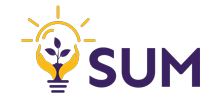The Erasmus+ funded project SUM is about designing a corporate social responsibility (CSR) framework that can guide start-up companies to think, plan and implement social responsibility from the beginning as an integral strategic instrument for visibility, growth and multiplication
Project Goals
Recognising the social and ecological impacts of entrepreneurial activity, thinking and acting responsibly, examining entrepreneurial decisions for their sustainability, benchmarking of the own performance in relation to CSR, these are all important competences for today’s corporate world. SUM wants to prepare budding and young entrepreneurs better to properly engage with CSR issues, provide them with guidance and support them to build the necessary capacities in an innovative way. The goals of SUM therefore include:
- Championing the value of sincere and professionally implemented CSR in companies, especially start-ups.
- Increasing the participation rate of start-ups in the CSR process through more welcoming services and improved institutional culture.
- Support in creating a better understanding of what constitutes CSR (corporate social responsibility), its origins, dimensions, business imperatives and opportunities for start-ups.
- Contribution to further clarification on what exactly is expected of start-up companies in order to fulfil the requirements for their corporate social responsibility.
- Capacity building in start-ups for the implementation of responsible entrepreneurial action.
- Emphasise corporate transparency as an important element for start-ups to maintain a reliable and trustworthy organisation; and demonstrate approaches of transparent design of CSR. Promote a reward system for start-ups that rewards the most outstanding and transparent start-ups.
- Strengthening networks and sharing new insights on embedding a CSR culture in start-ups, as well as good practice and quality resources on CSR.
Approach and Offer
SUM partner organisations have joined forces to reach the goals by
- Establishing a Corporate Social Responsibility (CSR) framework and governance approach for start-up companies that can hold as a standard across regional, national and European level and takes into serious account EU citizens’ rights and employability, accountability, citizen participation, social justice and environmental issues.
- Creating and piloting an innovative learning and supporting approach on taking entrepreneurial responsibility by start-up entrepreneurs and employees as well as aspiring entrepreneurs. The envisaged methodology will allow for flexible action-oriented learning in authentic situations, peer support, online learning and study visits. To facilitate the recognition and certification of the respective learning outcomes, SUM will base its education and training offer on the principles of ECVET (European Credit System for Vocational Education and Training) respectively ECTS (European Credit Transfer System, the European transfer and accumulation system for academic achievements).
- Providing a freely accessible online toolbox with curated existing learning units, materials, methods and tools on the consideration and integration of CSR in start-ups.
- Providing a training and policy adaptation guide that derives, based on the piloting experiences, recommendations for the integration of the training offer and accreditation processes in different and wider educational settings and informs future policies and initiatives in similar fields. The guide will be designed and published as an interactive eBook.
To whom SUM is addressed
The SUM approach is involving the following groups of persons:
- Start-up entrepreneurs and relevant employees who want to deal with the topic of CSR in a practical way;
- Trainers and educators who want to implement relevant learning offers;
- Counsellors and other professionals who support and accompany start-up companies;
- Researchers and academics working on the topic of CSR;
- Political actors and decision-makers as well as other relevant experts and stakeholders who support start-ups, shape educational agendas and offerings, and advocate for sustainability and corporate responsibility.

